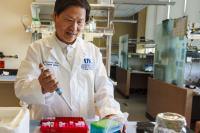Home > Press > New study shows promise in using RNA nanotechnology to treat cancers and viral infections
 |
| The University of Kentucky's Peixuan Guo is considered one of the top three nanobiotechnology experts in the world.
Credit: UK HealthCare |
Abstract:
A new study by University of Kentucky researchers shows promise for developing ultrastable RNA nanoparticles that may help treat cancer and viral infections by regulating cell function and binding to cancers without harming surrounding tissue.
New study shows promise in using RNA nanotechnology to treat cancers and viral infections
Lexington, KY | Posted on September 5th, 2012The study, published in Nano Today, was carried out in the laboratory of Peixuan Guo, the William S. Farish Endowed Chair in Nanobiotechnology at the UK Markey Cancer Center, in collaboration with Dr. Mark Evers, director of the UK Markey Cancer Center.
The study uses RNA (ribonucleic acid) as a building block for the bottom-up fabrication of nanostructures. Using the RNA nanotechnology pioneered by Guo, the researchers constructed ultrastable X-shaped RNA nanoparticles using re-engineered RNA fragments to carry up to four therapeutic and diagnostic modules. Their RNA nanoparticles can include small interfering RNA for silencing genes, micro-RNA for regulating gene expression, aptamer for targeting cancer cells, or a ribozyme that can catalyze chemical reactions.
The study demonstrated that regulation of cellular functions progressively increased with the increasing number of functional modules in the nanoparticle.
"RNA nanotechnology is an emerging field, but the instability and degradation of RNA nanoparticles have made many scientists flinch away from the research in RNA nanotechnology," Guo said. "We have addressed these issues, and now it is possible to produce RNA nanoparticles that are highly stable both chemically and thermodynamically in the test tube or in the body with great potential as therapeutic reagents."
The RNA nanoparticles displayed several favorable attributes: polyvalent nature, which allows simultaneous delivery of multiple functional molecules for achieving synergistic effects; modular design, which enables controlled self-assembly with defined structure; thermodynamically stable, which keeps the RNA nanoparticles intact in animal and human circulation systems, where they exist at very low concentrations; and chemically stable, which makes the nanoparticles resistant to RNase (an enzyme, which cleaves RNA) digestion in the blood serum.
"A major problem with cancer treatments is the ability to more directly and specifically deliver anti-cancer drugs to cancer metastases," Evers said. "Using the nanotechnology approach that Peixuan Guo and his group have devised may allow us to more effectively treat cancer metastasis with fewer side effects compared to current chemotherapy."
In addition to Evers and Markey team member Dr. Piotr Rychahou, Guo's research team at UK also includes Farzin Haque, first author on the paper; Dan Shu; Yi Shu; and Luda Shlyakhtenko.
####
For more information, please click here
Contacts:
Allison Perry
859-323-2399
Copyright © University of Kentucky
If you have a comment, please Contact us.Issuers of news releases, not 7th Wave, Inc. or Nanotechnology Now, are solely responsible for the accuracy of the content.
| Related News Press |
News and information
![]() Simulating magnetization in a Heisenberg quantum spin chain April 5th, 2024
Simulating magnetization in a Heisenberg quantum spin chain April 5th, 2024
![]() NRL charters Navy’s quantum inertial navigation path to reduce drift April 5th, 2024
NRL charters Navy’s quantum inertial navigation path to reduce drift April 5th, 2024
![]() Discovery points path to flash-like memory for storing qubits: Rice find could hasten development of nonvolatile quantum memory April 5th, 2024
Discovery points path to flash-like memory for storing qubits: Rice find could hasten development of nonvolatile quantum memory April 5th, 2024
Nanomedicine
![]() New micromaterial releases nanoparticles that selectively destroy cancer cells April 5th, 2024
New micromaterial releases nanoparticles that selectively destroy cancer cells April 5th, 2024
![]() Good as gold - improving infectious disease testing with gold nanoparticles April 5th, 2024
Good as gold - improving infectious disease testing with gold nanoparticles April 5th, 2024
![]() Researchers develop artificial building blocks of life March 8th, 2024
Researchers develop artificial building blocks of life March 8th, 2024
Discoveries
![]() Chemical reactions can scramble quantum information as well as black holes April 5th, 2024
Chemical reactions can scramble quantum information as well as black holes April 5th, 2024
![]() New micromaterial releases nanoparticles that selectively destroy cancer cells April 5th, 2024
New micromaterial releases nanoparticles that selectively destroy cancer cells April 5th, 2024
![]() Utilizing palladium for addressing contact issues of buried oxide thin film transistors April 5th, 2024
Utilizing palladium for addressing contact issues of buried oxide thin film transistors April 5th, 2024
Announcements
![]() NRL charters Navy’s quantum inertial navigation path to reduce drift April 5th, 2024
NRL charters Navy’s quantum inertial navigation path to reduce drift April 5th, 2024
![]() Discovery points path to flash-like memory for storing qubits: Rice find could hasten development of nonvolatile quantum memory April 5th, 2024
Discovery points path to flash-like memory for storing qubits: Rice find could hasten development of nonvolatile quantum memory April 5th, 2024
Nanobiotechnology
![]() New micromaterial releases nanoparticles that selectively destroy cancer cells April 5th, 2024
New micromaterial releases nanoparticles that selectively destroy cancer cells April 5th, 2024
![]() Good as gold - improving infectious disease testing with gold nanoparticles April 5th, 2024
Good as gold - improving infectious disease testing with gold nanoparticles April 5th, 2024
![]() Researchers develop artificial building blocks of life March 8th, 2024
Researchers develop artificial building blocks of life March 8th, 2024
|
|
||
|
|
||
| The latest news from around the world, FREE | ||
|
|
||
|
|
||
| Premium Products | ||
|
|
||
|
Only the news you want to read!
Learn More |
||
|
|
||
|
Full-service, expert consulting
Learn More |
||
|
|
||








